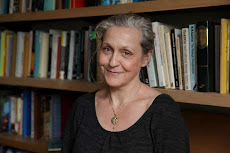I have been puzzling over my utter failure to be turned on by Joan and Harold (BBC Radio 4).
In fact, I turned the pair decidedly off.
I
wondered why. Surely a twisted tale of misery
with a few laughs to jolly along the dead is right up my street.
Perhaps I should make myself listen to it, because instinctively I don't want to.
And
Eng. Lit students are supposed to thrill at the emotional rollercoasters of
the great and good, are we not? Finding a juicy morsel about T. S.
Eliot is supposed to keep us going for years. It works for Sylvia
and Ted.
But I am old. I am past it. I don't want to wonder on the affairs of your heart.
And, pragmatically, realistically, affairs are shit. You are low-life if you have them. Yes indeed, affairs are all about betrayal. Destruction, loss, mayhem and heartbreak. With bomb
blasts of trust. And you can't have your trust back once you broke it. You are the person whose word can't be trusted. Lying to your
kids is the exit visa from your tribe.
Maybe I simply wanted
better from Joan and Harold. As national treasures, surely they have to
uphold certain moral values? They are meant to be better than me, better
than the nation. They should lead by example and stand for something,
right? Perhaps they're standing for the way that lies and deceit can be
problematic, thrilling, and, um, noble?
And here, I think, is the start of my problem. Joan and Harold are just too damn self-absorbed to be problematic, thrilling, or noble.
Yes,
of course the artist must tip into their work their experiences of
life. Good, bad, worse and ugly, shit and horrible. It is essential.
That moment of the artist - exploring their experiences, exposing their
emotions, making themselves vulnerable through their materials, whether
it is words, textile or paint - puts integrity and authenticity at the heart of their work.
Maybe
this is a quaint old-fashioned idea. How I want art to be a bond between
people. I want how art can create a sort of trust - perhaps the thought that yes, artist and audience, we do
share common feelings; that we can see messages and know shared signs,
even if I'm imagining those, or comforting myself by making them up in
my own head. But at some level, I'm looking for commonality.
And it is a basis on which a buyer stumps up the cash, is it not?
As
a buyer, I'm buying not just the art, but a bit of the artist too. I
buy into their experience and the feeling they've had. Maybe I've had
that same experience, or maybe I just want to tip my toe into the pool
of what that experience brings to my imaginations for humanity.
That's where Joan and Harold fail. They're selling their feelings and ideas of untrustworthiness,
lies, infidelity, and betrayal, then telling me: Trust in this. Maybe in the exploration of these ideas, they're still slugging it out
with each other, looking at each other as their prime audiences. This is what I wanted to say. It doesn't
matter that one of them is dead.
Then is it celebrity
culture that I'm watching? Joan's spin-off books, chat shows, new contracts; Harold's hoisting material back on the best-seller lists. It's a market. We
buyers need to buy the thrill of those words clandestine affair. (But how many years have the words been peddled?)
Joan and Harold. Sorry, but I won't be listening, not on the iplayer, and not even though my whiny Eng Lit voice tells me I really, really should, because your words are art.
Ultimately, I want to trust the artist. And when I do, I want to hand over my support for something more thought-provoking, elevating and invigorating and even more blasted funny than Trust me, I had a clandestine affair.
Wednesday 26 April 2017
Subscribe to:
Post Comments (Atom)



No comments:
Post a Comment